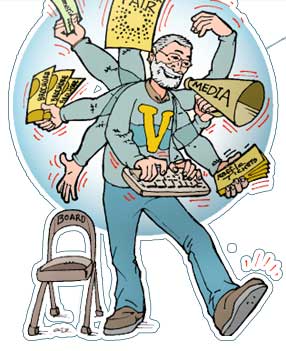








Star Power Mirrors Real Life
Brandon
Sun “Small World” Column, Monday,
August 11 / 25
Zack Gross
Zack Gross
It’s interesting how some things never change. As a young university student, back so long ago, in my first years of volunteering for an international development group in Winnipeg, one of the ways we engaged particularly with students to make them aware of global issues such as poverty, was to bring a role-playing or simulation game to their classrooms. Now, more than fifty years later, we could take the same game, Star Power, to any classroom and it would still be relevant.
Here is how the game was played. A small number of people in the class (or church group, service club, etc.) were designated as the Squares. A larger group were set aside as the Circles, and a third group, by far the largest, were hived together in the room as the Triangles. Each person was given an envelope with large poker chips of different colours (red, blue, green), each holding a different value. Unknown to the players, the small group of Squares received the highest valued tokens, the Circles got a middling amount, and the Triangles got the lowest valued tokens. One member of each of the Circles and Triangles, however, received a generous amount in their envelope. With me so far?
Then, we instructed the players to get out there with the others in the room and trade tokens, trying to improve their scores. Mayhem ensued. After a few minutes of that activity, we recorded everyone’s total on the blackboard and, of course, one could see that the Squares were way ahead. After a second round of trading, we added the new individual totals to their previous ones, and one could see that even if people at the bottom maintained their numbers, they were still falling further behind those at the top. If you had a two-round point accumulation of ten plus ten, then you scored twenty. But, if you had even results but with 50 plus 50, then you were up to 100!
The players planted in the Circles and Triangles with larger amounts usually convinced their groups that they should be sent up to the Squares with the idea that they would advocate for their poorer groups. Sometimes that is what they would do, while other times they would just join the wealthier group and forget their origins. Then the Squares, as the richest and, we would say to them, obviously the most able, would be given the privilege (responsibility?) of making the trading rules for the rest of the game. Most often, this “leadership” group would enact rules to further increase their financial standing. Occasionally, but less often, the Squares would opt to improve the lives of the poorer members in the room.
I probably played this game a hundred times over the years with a variety of groups throughout Southern Manitoba, in small towns to the big city. We would sometimes enhance the experience by serving meals to the Squares, snacks to the Circles, and nothing to the Triangles. Sometimes, people would get quite upset by the game, other times it was just a fun experience and a new way to learn.
In debriefing Star Power with participants afterwards, depending on age group and daily lives, lots of interesting comments were made. Some students would equate the Star Power experience to their home lives or their relations with friends. Young people might see the power of their parents as a difficulty or feel that they really needed more allowance! Working people would see issues that arose at work, or in their community, or in the wider world. Of course the most frequent comment was “The rich get richer and the poor...”!
But one might also hear from some participants that those who are well off had attained that position because of their hard work and smart brains. To this we would point out that, at least in the game, it was a set-up – nobody in the game had actually “earned” having more high-value tokens. It was more of an inheritance, or privilege in real life that we are born into because of our class status or, in a global context, because we live in a wealthy, more democratic and progressive country.
Today in our world, we can see that military might, political power and accumulated wealth still put some people – a small group - ahead, in every way, of the rest. Whether in the hot spots in today’s news – Eastern Europe, the Middle East, Africa – or in the political turmoil with our trading partners, it is a challenge to bring about just and sustainable change in the face of might, wealth and power. Star Power is just a game, and maybe doesn’t get played that much anymore, but it’s message is still relevant.
Zack Gross is Board Chair of The Marquis Project, a Brandon-based international development organization, and co-author of the new book The Fair Trade Handbook: Building a Better World, Together.
* * * * *
Return to Articles page
Return to Articles page